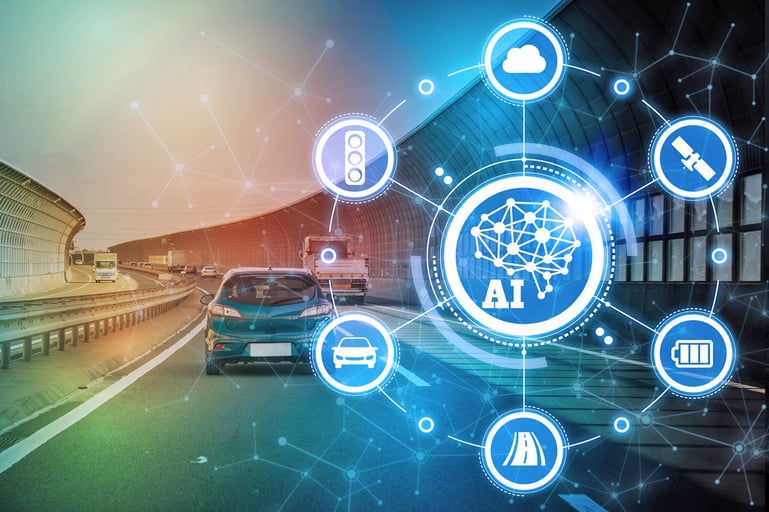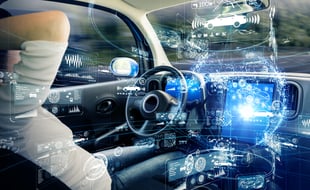
Recently, some of our merchant dealers have been asking us about artificial intelligence – what is it, how does it work, and most importantly, can artificial intelligence help auto dealerships increase revenue? To answer those questions, let’s start with some background.
In 1950, Alan Turing wrote a paper titled “Computing Machinery and Intelligence.” His idea was: “Humans use available information as well as reason to solve problems and make decisions, so why can’t machines do the same thing?” The problem back then was that computers could not store enough information, or process it fast enough, to add value to the procedure. We needed more processing power, new software, and ultimately putting the GPU in the cloud. This took a few more decades, plus the power of Moore’s Law, to be viable.
Summary of Article
 What Are the Different Types of Artificial Intelligence?
What Are the Different Types of Artificial Intelligence?- What Types of Artificial Intelligence Are Available to Auto Dealerships?
- Can AI Improve Auto Dealership Sales and Marketing?
- Can AI Improve the Customer Experience at Auto Dealerships?
A great deal of work was conducted during the intervening years. The first newsworthy success story was in 1997 when IBM’s “Deep Blue” computer beat world chess champion Gary Kasparov in a chess match. That was considered revolutionary at the time.
Motormindz, a consultancy company to the auto industry, breaks artificial intelligence (AI) down to three levels.
What Are the Different Types of Artificial Intelligence?
The first is “Narrow AI.” It is used for single tasks, such as retargeting speech and image recognition, and it is available now in different forms.
The second is “General AI,” which is not yet available. It would provide human-level understanding, where machines would tie together different things that are conceptually unequal.
The third is true Artificial Intelligence, where the computer has a cognitive ability equal to or superior to a human. This may never happen.

What Types of Artificial Intelligence Are Available to Auto Dealerships?
Cox has a product called Clutch, a vehicle subscription program. It creates an engaging experience that is AI-driven. The consumer feels engaged, connected, and heard. The service receives telematics data from the vehicle and asks customers questions. This creates a profile that should personalize the consumer’s car-buying experience without having to visit the dealership. (Not to make too fine a point, but if this works, why does the dealership need people, buildings, a lot, and amenities to make this sale?)
AI can also be used to improve productivity in the store. Artificial intelligence programs can monitor employees’ work schedules in real-time to better deploy them during slow periods and to make it easier for them to do certain tasks, thus freeing up time.
AI can also help with pricing and inventory choices to get cars sold faster. AI can find patterns to determine the demand side of the equation: what is selling now and how fast, where is the market, and what are the patterns?
Another example is the scheduled markdowns that dealers use to get cars that are taking longer than normal to sell off the lot. These units will be sent to the auction or traded to another dealer.
AI can also customize a marketing campaign to a specific VIN, so the dealer can better predict when the car will age out. AI can advise on which cars justify a higher price and should be kept versus which should be turned more quickly. To accomplish this, AI considers the relevant dealer history such as local market demand, supply, local competition, and sales history.
Can AI Improve Auto Dealership Sales and Marketing?
Dealers know the customer experience is crucial to making the sale. The big change came in 2014 with what was called “Mobilegeddon.” This was the first time people interacted more on their mobile device than on their desktop.
Today, consumers are entirely engaged on their mobile devices. AI can analyze online shopping behavior, predict sales and create audiences, and put the exact car that the consumer wants in front of them online on their mobile device, so they will come to your store to buy it.
AI can help the dealer connect with the consumer by helping with lead generation, sales contracts, financing, and servicing. It can match the consumer to the car, get financing at the best cost and deal for the consumer, and keep the customer driving and happy so they will return later.
Machine learning, neural networking, and deep learning can be used for scoring, optimization, and to get market information on which product works best for the consumer. It can also be used in underwriting, loan operations, and insurance as a recommendation engine.
Another area where AI can help is with “callbacks.” A callback is when you send the customer’s financial information to the lender, and you get a response that the customer is “conditionally approved,” but you need to call the lender back to resolve a few issues. Each lender has its own specific set of lending criteria. Rather than spending an hour trying to put the deal together, which would be nerve-wracking for the consumer, use AI to search for a solution and reduce or try to eliminate callbacks in the first place. About 65% of the lender’s decision is going to be based on the “Three Cs”:
- Character of the borrower and their payment history.
- Capacity (debt-to-income ratio).
- Collateral (the vehicle).
Can AI Improve the Customer Experience at Auto Dealerships?
AI can spot potential roadblocks up front in each of the three areas, and then you can be pro-active in managing the presentation to the lender. For instance, there may be some late payments, which could be explained by sickness, loss of employment, a death in the family, or other things. Perhaps the collateral needs to be changed (getting a cheaper car) or a larger down payment is needed. AI can rebuild the structure of the loan application so you can avoid a callback and improve the customer experience.
 We recently heard about a luxury make dealer who insists that the customer pay with a check, and then requires the salesperson drive the buyer to their bank to get a cashier’s check! This is insulting to the buyer and creates a terrible customer experience.
We recently heard about a luxury make dealer who insists that the customer pay with a check, and then requires the salesperson drive the buyer to their bank to get a cashier’s check! This is insulting to the buyer and creates a terrible customer experience.
The right way to do this is to have CrossCheck guarantee the payment using the Multiple Check service, which only takes a moment and is seamless to the buyer. If the buyer’s check bounces, it will cause the dealer to unwind the deal because the dealer is responsible for all payments in the first 30 days. After that the lender takes responsibility.
It just makes good business sense for the dealer to take checks instead of high-interchange credit cards, and to have the checks guaranteed by CrossCheck. This prevents a rollback if the check bounces.
Multiple Check gives the consumer extra time (usually 30 days) to come up with the amount due, which lets them buy the car they want and the options they want without having to settle for a cheaper car. They simply write 2 – 4 checks bearing the purchase date, and then choose the amount and deposit date for each one. The extra time allows them to replenish their checking account. This creates a great customer experience. Happy motoring!
Download our free guide to learn how Multiple Check can help increase sales and mitigate risk while saving time and money at your dealership.


